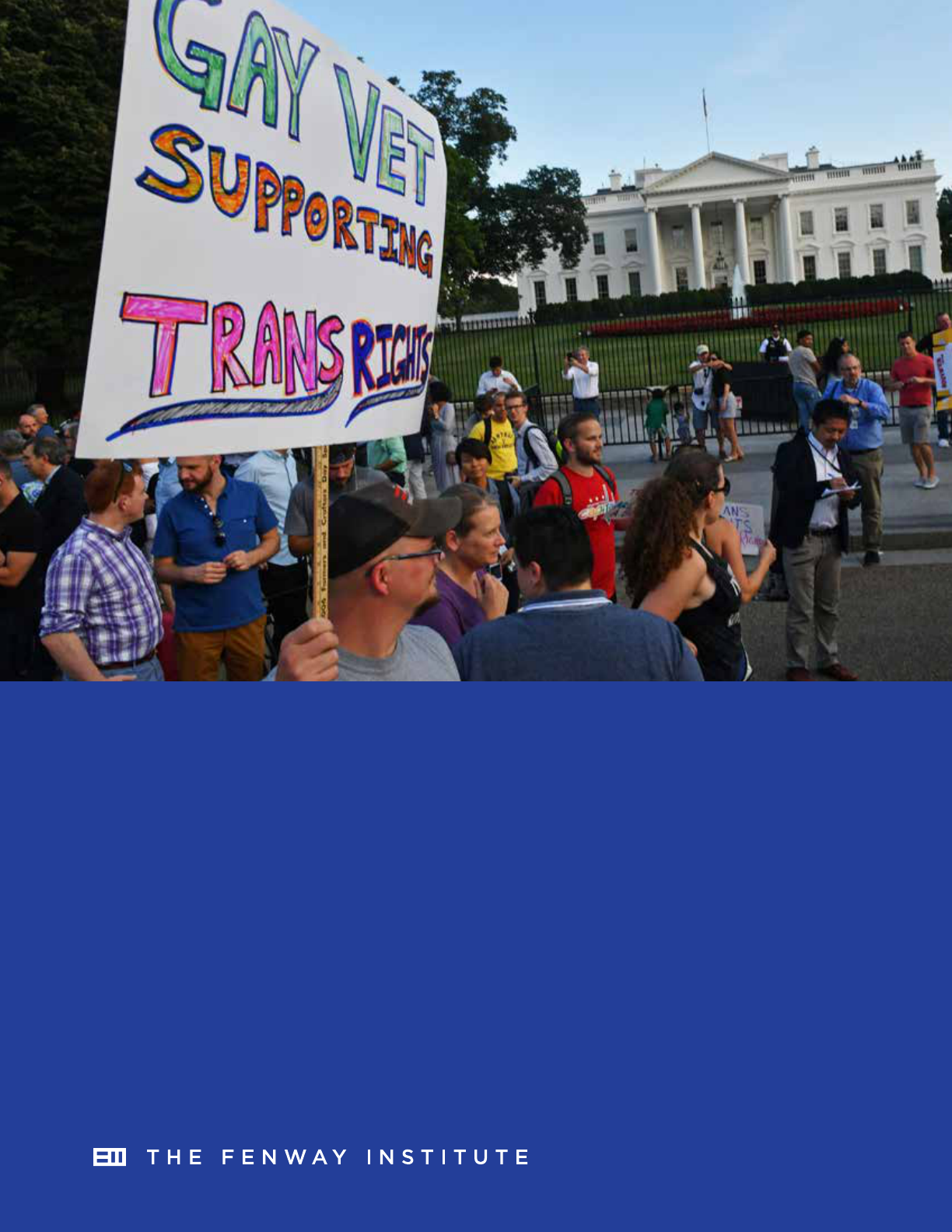
PB 1
Trump Administration continued to
advance discriminatory policies and
practices against LGBT people and
people living with HIV in 2018
By Sean Cahill, Tim Wang and Bishar Jenkins
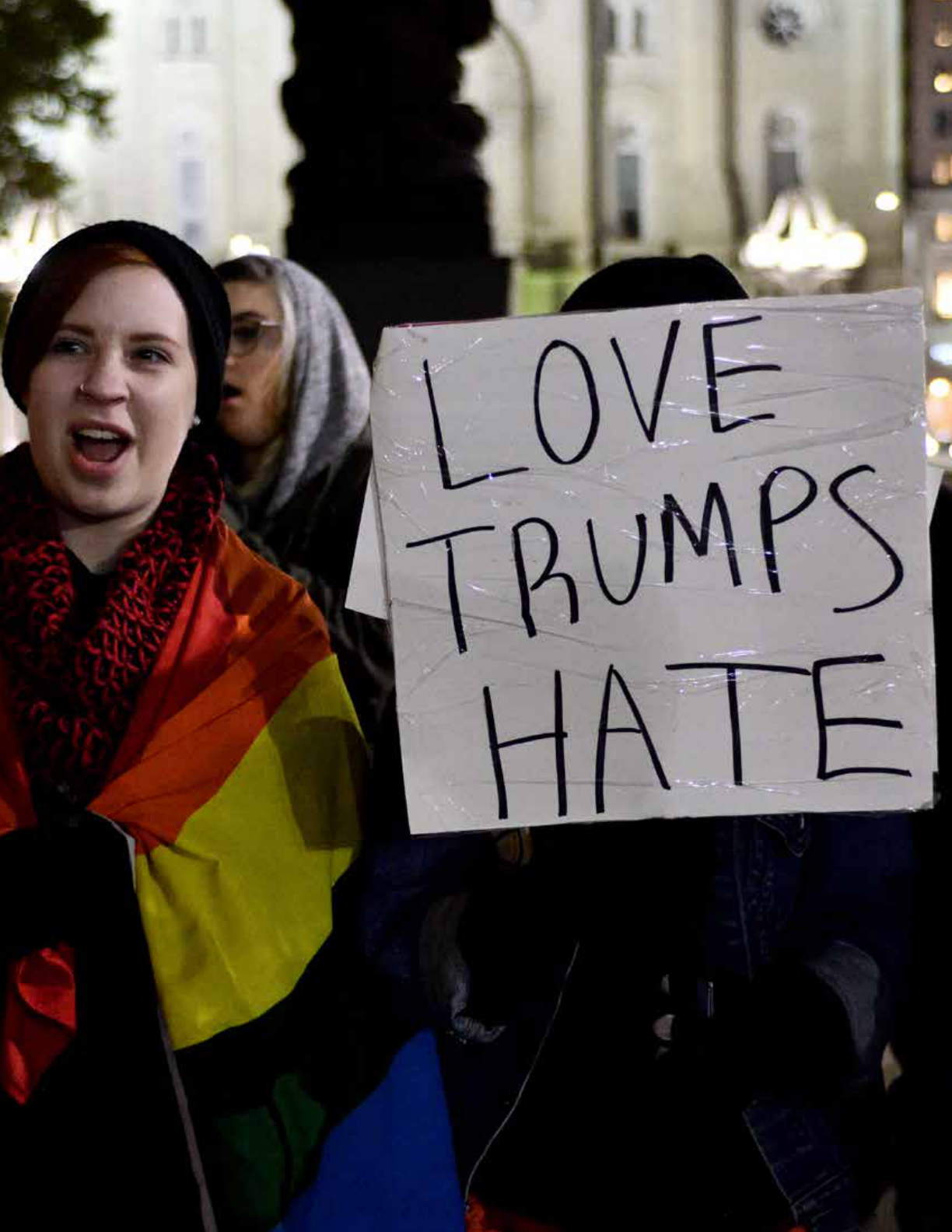
2 3

2 3
INTRODUCTION
In 2018 the Trump Administration continued to advance discriminatory policies that under-
mine the ability of LGBT people to access health care and other services. It also restrict-
ed the right of transgender people to serve in the military, and the right of people living
with HIV to serve in the Peace Corps. The Trump Administration promoted religion-based
discrimination against LGBT people, eliminated critical nondiscrimination protections, and
appointed federal judges who oppose LGBT equality. The administration’s frequent alia-
tions with anti-LGBT advocacy organizations, such as Focus on the Family and the Family
Research Council, clearly display hostility toward LGBT equality.
Despite this bleak picture, there were some potentially hopeful developments, such as the
Food and Drug Administration’s regulation of e-cigarettes, which LGBT people use at a dis-
proportionate rate, and indications that the federal government will develop a new national
HIV/AIDS strategy to take eect in 2020, and reconvene the President’s Advisory Council
on HIV/AIDS.
During its first year in oce, as we documented in a January 2018 report,
1
the Trump
Administration compiled a strikingly anti-LGBT record of executive branch actions that
undermined the health and well-being of LGBT people. These included rescinding guidance
to schools that discrimination based on gender identity violates Title IX of the Education
Amendments of 1972, reversing Department of Justice policy interpreting Title VII of the
In 2018 the Trump Administration restricted
the right of transgender people to serve in the
military, and the right of people living with HIV
to serve in the Peace Corps.
1
Cahill S, Geen S, Wang T (2018, January 16). One year in, Trump Administration amasses striking anti-LGBT record. Boston: The Fenway Institute.

4 5
Civil Rights Act of 1964 to prohibit gender identity discrimination, reversing progress on
sexual orientation and gender identity (SOGI) data collection in federal surveys, weaken-
ing the Aordable Care Act, and failing to
promote LGBT equality as a key goal of U.S.
foreign policy.
Overall in its second year in oce, the Trump
Administration continued building upon the
striking record against LGBT rights that it
amassed in its first year. This assault on the
human rights of LGBT people and people
living with HIV (PLWH) is part of a broader
attack on racial, religious, and gender equal-
ity, and on key institutions of our democracy,
such as an independent, free press. Despite
candidate Trump’s claim that he would advo-
cate for LGBT Americans, the Trump Admin-
istration continues to expand discriminatory
policies toward LGBT people.
I. ROLLBACK OF LGBT NONDISCRIMINATION
REGULATIONS
Trump Administration ocials took a number of steps in 2018 that undermine nondiscrimi-
nation protections for LGBT people. In February 2018, the Department of Education de-
cided not to hear complaints regarding transgender individuals’ access to restrooms that
correspond to their gender identity. Further, the Department has refused to issue rulings
on complaints on that issue, signaling that it will not advocate for transgender youth in
schools.
2
This builds on anti-transgender actions taken in 2017. In February 2017, the U.S.
Department of Justice and the Department of Education notified the U.S. Supreme Court
that they were ordering schools across the U.S. to ignore 2016 guidance issued by President
Obama’s Department of Justice and Department of Education stating that discrimination on
the basis of gender identity in schools is prohibited under Title IX.
3,4
Despite this bleak picture,
there were some potentially
hopeful developments, such
as the Food and Drug Admin-
istration’s regulation of e-ciga-
rettes, which LGBT people use
at a disproportionate rate.
2
Turner C, Kamenetz A. (2018, February 12). The Education Department Says It Won’t Act on Transgender Student Bathroom Access. NPR. https://
www.npr.org/sections/ed/2018/02/12/585181704/the-education-department-says-it-wont-act-on-transgender-student-bathroom-access
3
Somashekar S, Brown E, Vucci E. (2017). Trump Administration rolls back protections for transgender students. Washington Post. https://www.
washingtonpost.com/local/education/trump-administration-rolls-back-protections-for-transgender-students/2017/02/22/550a83b4-f913-11e6-
bf01-d47f8cf9b643_story.html?utm_term=.11ef42f0311c
4
Department of Justice press release (2016, May 13). U.S. Departments of Justice and Education release joint guidance to help schools ensure the civil
rights of transgender students. https://www.justice.gov/opa/pr/us-departments-justice-and-education-release-joint-guidance-help-schools-ensure-
civil-rights

4 5
In March 2018, Secretary of Housing and Urban Development (HUD) Ben Carson altered the
Department’s mission statement to eliminate references to inclusion and protection from dis-
criminatory housing practices. This development is especially concerning, as HUD was formed
to address systemic racial discrimination in housing and lack of access to quality housing.
5
This
approach also diverges from the Obama Administration’s inclusive approach to expanding ac-
cess and opportunity to housing. In 2012, the Obama Administration released an Equal Access
Rule, which said that “the federal Department of Housing and Urban Development guarantees
access to its programs regardless of ‘actual or perceived sexual orientation, gender identity or
marital status (Equal Access Rule, 24 CFR 5.105(a)(2)).’”
6
In an October 2018 brief to the U.S. Supreme Court, the Department of Justice argued that
gender identity is outside of the scope of Title VII of the Civil Rights Act of 1964, which
prohibits discrimination on the basis of “race, color, religion, sex and national origin.”
7
This
contradicts six federal appellate court rulings as of
October 2018 that gender identity discrimination is a
form of sex discrimination and therefore prohibited
under Title VII.
8
In October 2018, the Department of Health and Hu-
man Services, in collaboration with the Department
of Justice and the Department of Education, was re-
ported to have drafted a memorandum which sought
to redefine sex as fixed and unalterable under Title
IX. The only recognized sexes would be male and
female. This narrow definition would ignore the reality
and existence of the estimated 1.4 million transgen-
der Americans living across the U.S.,
9
as well as the
up to 1.7% of the population with variations in their sex characteristics (known as intersex).
10
The memorandum encouraged departments and agencies throughout the federal government
to adopt a similar approach by stating, “[gender should be determined] on a biological basis
that is clear, grounded in science, objective and administrable.”
11
However, this narrow definition
The Trump Administration
has sought to redefine sex
as fixed and unalterable
under Title IX.
5
Terkel A. (2018, March 6). Ben Carson Removes Anti-Discrimination Language from HUD Mission Statement. Hungton Post. https://www.hung-
tonpost.com/entry/hud-mission-statement_us_5a9f5db0e4b002df2c5ec617
6
Sullivan B. (2016, September 20). HUD ISSUES FINAL RULE TO ENSURE EQUAL ACCESS TO HOUSING AND SERVICES REGARDLESS OF
GENDER IDENTITY. U.S. Department of Housing and Urban Development. https://archives.hud.gov/news/2016/pr16-137.cfm
7
Moreau J. (2018, October 25). Transgender workers not protected by civil rights law, DOJ tells Supreme Court. NBC News. https://www.nbcnews.
com/feature/nbc-out/transgender-workers-not-protected-civil-rights-law-doj-tells-supreme-n924491
8
Ibid.
9
Flores, A., Herman, J., Gates, G., and Brown, T. (June 2016). How Many Adults Identify As Transgender In The United States. The Williams Institute.
https://williamsinstitute.law.ucla.edu/wp-content/uploads/How-Many-Adults-Identify-as-Transgender-in-the-United-States.pdf
10
Melanie Blackless et al. (2000). How Sexually Dimorphic Are We? Review and Synthesis, 12 American Journal of Human Biology 151.
11
Green E, Benner K, Pear R. (2018, October 21). Transgender Could Be Defined Out of Existence under Trump Administration. New York TImes.
https://www.nytimes.com/2018/10/21/us/politics/transgender-trump-Administration-sex-definition.html

6 7
is not grounded in science at all, as professional medical and health organizations—such
as the American Medical Association
12
and the American Psychiatric Association
13
—have
for years confirmed that there is a complex medical spectrum of sex that includes genetic
markers, internal and external anatomy, and gender identity, which may itself have a biolog-
ical component. Not only is this memo at odds with established medical research, it could
also have wide-reaching public health consequences by weakening nondiscrimination pro-
tections for transgender people in health care, education, and elsewhere. This is especially
concerning, as discrimination against transgender people is already common, and can act
as a barrier to seeking necessary care.
14
II. SEXUAL ORIENTATION AND GENDER IDENTITY
DATA COLLECTION
In 2018, the Trump Administration continued to remove sexual orientation and gender
identity (SOGI) questions items from federal surveys. The Bureau of Justice Statistics (BJS)
released a proposal to remove SOGI questions from the National Crime Victimization Survey
(NCVS) for 16- and 17-year old respondents. BJS said it was removing the questions be-
cause they are too “sensitive” for adolescents to consider.
15
The NCVS is one of the coun-
try’s main sources of data on criminal victimization, including information on hate violence,
sexual assault, intimate partner violence, and experience with the criminal justice system.
LGBT people—and especially black gay and bisexual men and transgender women—are of-
ten the victims of bias-motivated hate violence. In fact, on a per capita basis, LGBT people
are more likely to be the targets of hate crimes than any other group in America.
16
In 2014,
one fifth (20.4%) of reported hate crimes were perpetrated based on the victim’s sexual
orientation or gender identity.
17
According to data from the 2015 Youth Risk Behavior Survey, 10% of LGB youth nationally
reported being threatened or injured with a weapon on school property, compared with
12
American Medical Association. Medical Spectrum of Gender D-295.312.https://policysearch.ama-assn.org/policyfinder/detail/spectrum%20gen-
der?uri=%2FAMADoc%2Fdirectives.xml-D-295.312.xml.
13
American Psychiatric Association. Gender dysphoria. DSM-5. Arlington, VA, 2013. http://www.dsm5.org/documents/gender%20dysphoria%20
fact%20sheet.pdf
14
Reisner SL, White Hughto JM, Dunham E, Heflin K, Begenyi JB, Coey-Esquivel J, Cahill S (2015, Sep). Legal protections in public accommodations
settings: A critical public health issue for transgender and gender nonconforming people. Milbank Quarterly. 93(3):484-515.
15
Bureau of Justice Statistics, Department of Justice. (April 11, 2018). “Agency Information Collection Activities: Proposed eCollection eComments
Requested; Revision of a Currently Approved Collection; Comments Requested: National Crime Victimization Survey (NCVS).” Document Citation
83 FR 15634. https://www.federalregister.gov/documents/2018/04/11/2018-07448/agency-information-collection-activities-proposed-ecollec-
tion-ecomments-requested-revision-of-a
16
Park H, Mykhyalyshyn I. (2016, June 16). L.G.B.T. People Are More Likely to Be Targets of Hate Crimes Than Any Other Minority Group. The New
York Times.
17
Federal Bureau of Investigation. (2014). Uniform Crime Reports: 2014 Hate Crime Statistics. Available at https://www.i.gov/about-us/cjis/ucr/
hate-crime/2014

6 7
5.1% of heterosexual youth. According to
GLSEN’s 2015 National School Climate Sur-
vey, 27.0% of LGBT students reported being
physically harassed in the past year based
on sexual orientation, and 20.3% reported
being physically harassed based on their
gender expression. Because of harassment
in schools, compounded with other factors
such as family rejection and homelessness,
LGBT youth are particularly vulnerable to
interaction with the criminal justice system.
Removing the SOGI questions from the
NCVS for 16- and 17-year old respondents
will impair attempts to better understand
and address the pervasive violence and
victimization disproportionately aecting
LGBT youth. As to the claim that SOGI are
too sensitive to ask adolescents, most states now ask high school students about sexual
orientation on the Youth Risk Behavior Survey,
18
and a growing number of states ask about
transgender status.
Background
For decades, researchers and activists have promoted adding sexual orientation and gender
identity (SOGI) questions to federal surveys to capture health and demographic data about
LGBT people. Under the Obama Administration the number of federal surveys and studies
measuring sexual orientation increased to 12; seven of these also measured gender identity
or transgender status.
19
In 2017, the Trump Administration halted the forward momentum
on adding SOGI questions to surveys by proposing the elimination of SOGI questions from
the National Survey of Older Americans Act Participants (NSOAAP) and reversing plans to
add SOGI questions to the Administration for Community Living’s (ACL) Annual Program
Performance Report for Centers for Independent Living in 2017.
20
While the sexual orien-
tation question was eventually added back onto the NSOAAP, it continues to exclude a
transgender status question that was asked previously. The ACL survey, which could provide
important data on LGBT people living with disabilities, has not added the SOGI questions as
originally planned for 2017.
In 2018 the Bureau of Justice
Statistics released a proposal
to remove SOGI questions
from the National Crime
Victimization Survey (NCVS)
for 16- and 17-year old
respondents.
18
Kann L., McManus T., Harris W.A., et al. (2018). Youth Risk Behavior Survey—United States, 2017. MMWR Surveill Summ;67(No. SS-8):1-479. https://
www.cdc.gov/healthyyouth/data/yrbs/pdf/2017/ss6708.pdf
19
Federal Interagency Working Group on Improving Measurement of Sexual Orientation and Gender Identity in Federal Surveys. (2016, Au-
gust). Current measures of sexual orientation and gender identity in federal surveys. https://s3.amazonaws.com/sitesusa/wp-content/uploads/
sites/242/2014/04/WorkingGroupPaper1_CurrentMeasures_08-16.pdf
20
Singh S, Durso LE, Tax A. (2017). The Trump Administration is rolling back data collection on LGBT older adults. Center for American Progress.
https://www.americanprogress.org/issues/lgbt/news/2017/03/20/428623/trump-administration-rolling-back-data-collection-lgbt-older-adults/

8 9
III. PREVENTING TRANSGENDER PEOPLE
FROM SERVING IN THE MILITARY
The Trump Administration has opposed legal equality for transgender people on a number
of fronts. In July 2017, President Trump issued a series of tweets announcing a ban on trans-
gender people serving in the U.S. military based on “tremendous medical costs and disrup-
tion” that he believed transgender troops would impose.
21
Several attorneys representing
active-duty service members moved to block Trump’s transgender military ban. In response,
Secretary of Defense General James Mattis revised the policy so that it would prevent trans-
gender people from serving if they sought to undergo medical transition, but would allow
transgender personnel already serving to continue serving. It would also technically allow
transgender troops to serve, but they would have to serve in accordance with their biologi-
cal sex rather than their gender identity. This clearly still presented unnecessary roadblocks
to allowing transgender people to serve openly in the military.
22
The Trump Administration has attempted to imple-
ment its transgender military ban multiple times
over the past two years through the issuance of
rules and regulations within the U.S. Departments
of Defense and the Department of Homeland
Security. However, the military ban continued to be
blocked by federal courts. As a result, the Trump
Administration is now attempting to circumvent
the typical process, by suggesting that the con-
servative-leaning U.S. Supreme Court abandon
its custom and rule on a transgender military ban
before all regional circuit courts render a decision
on the matter.
23
This approach demonstrates the
Administration’s aversion to proper governmental checks and balances, but it also reveals
the Administration’s eagerness to eectuate a discriminatory policy that would prevent
transgender individuals from serving their country. As we went to press, the U.S. Court of
Appeals for the D.C. Circuit sided with the Trump Administration and the Pentagon in sup-
port of the transgender military ban.
23.1
The transgender military
ban continued to be
blocked by federal courts.
21
Cahill S, Geen S, Wang T (2018, January 16). One year in, Trump Administration amasses striking anti-LGBT record. Boston: The Fenway Institute, 7.
22
Marimow A. (December 10, 2018). “Trump administration: It’s ‘extraordinary’ judges won’t let military restrict transgender troops.” The Washington
Post. https://www.washingtonpost.com/local/legal-issues/president-trumps-transgender-military-ban-is-back-in-court/2018/12/09/56a0c13a-f965-
11e8-8c9a-860ce2a8148f_story.html?utm_term=.69317f5fc7c7
23
Barnes R. (2018, November 23). Trump Administration asks Supreme Court to immediately take up military transgender ban. The Washington Post.
https://www.washingtonpost.com/politics/courts_law/trump-Administration-asks-supreme-court-to-immediately-take-up-transgender-military-
ban/2018/11/23/6cf11b32-ef39-11e8-8679-934a2b33be52_story.html?utm_term=.b8e2e5c3709e
23.1
AP Sta. (2019, Jan. 6). “Appeals court sides with Trump in transgender military case.” Associated Press. https://www.wric.com/news/politics/ap-
peals-court-sides-with-trump-in-transgender-military-case-1/1688792700

8 9
In an eort to garner support for his proposed military ban after several court injunctions, it
was revealed in reports that President Trump enlisted the assistance of the Family Research
Council, an evangelical organization actively opposed to LGBT rights, to help draft the new
policy to implement the transgender military ban.
24
Employing the advice of the Family
Research Council, the Trump Administration attempted to frame the transgender ban as a
military readiness issue, when the evidence proves that transgender individuals are able to
carry out their ocial duties with the same eectiveness as their cisgender counterparts
and that there are no medical impediments to their service in the military.
25
IV. JUDICIAL APPOINTEES WITH PROBLEMATIC
RECORDS ON LGBT EQUALITY
In July 2018, President Trump appointed U.S. Court of Appeals Circuit Court Judge Brett
Kavanaugh to the vacant seat left by retiring Justice Anthony Kennedy. Kennedy was a
supporter of LGBT equality and privacy going back to the landmark Romer v. Evans case,
which found that an anti-gay Colorado ballot referendum violated the “equal protection
of the laws” guaranteed by the Fourteenth Amendment to the U.S. Constitution.
26
Judge
Kavanaugh’s record on LGBT rights and his comments during his 2006 and 2018 confirma-
tion hearings are concerning for LGBT people. During his U.S. Supreme Court confirmation
hearing, Kavanaugh was asked by Senator Kamala Harris if he believed that the Supreme
Court’s landmark decision in Obergefell v. Hodges, which legalized same-sex marriage in all
50 states, was correctly decided or not. Kavanaugh repeatedly refused to answer Senator
Harris’s question and instead quoted Justice Kennedy’s opinion in the Masterpiece Cake
Shop case, which found that a wedding cake baker could refuse to serve a gay couple.
27
Kavanaugh’s unwillingness to fully elucidate his opinion on LGBT rights or arm the funda-
mental equality of LGBT people is a source of concern.
24
Stern M. (2018, March 24). “Trump’s Trans Troops Ban Will Never Take Eect.” Slate. https://slate.com/news-and-politics/2018/03/trumps-new-
trans-troops-ban-is-still-unconstitutional.html
25
Schaefer A. (2016, June). Impact of Transgender Personnel on Readiness and Healthcare Costs in the U.S. Military Likely to Be Small. RAND Corpo-
ration. https://www.rand.org/news/press/2016/06/30.html
26
Romer v. Evans, 517 U.S. 620 (1996
27
Scott E. (2018, September 7). “In Kavanaugh’s non-answer on same-sex marriage, many heard a troubling response.” The Washington Post.
https://www.washingtonpost.com/politics/2018/09/07/kavanaughs-non-answer-same-sex-marriage-many-heard-troubling-answer/?utm_ter-
m=.2ea4b10629f3

10 11
From June 2003 to May 2006, Kavanaugh served as Sta Secretary to President George
W. Bush. During this time, President Bush spoke out frequently against same-sex marriage,
which became legal in Canada in mid-2003 and in Massachusetts in late 2003.
28
In 2004, 13
states considered and passed anti-gay ballot measures banning same-sex marriage. This was
widely viewed as a factor in the election of Bush and Dick Cheney in 2004.
29
President Bush
also promoted a federal anti-gay marriage amendment at this time. During Kavanaugh’s
2006 confirmation to the U.S. Court of Appeals, in response to a question regarding expand-
ing the definition of marriage through judicial or legislative means, Kavanaugh remarked that
“some of the worst moments in the Supreme Court history have been moments of judicial
activism, where courts have imposed their own policy preferences.”
30
This echoed President
Bush’s statement in 2004, when he endorsed
the federal anti-gay marriage amendment, in
which he denounced “activist judges…[who]
have made an aggressive attempt to rede-
fine marriage.”
31
Of course, religious right and
anti-gay activists and politicians, such as the
American Center for Law and Justice, have no
problem challenging pro-gay family recognition
policies in the courts,
32
leading to the conclu-
sion that “activist judges” are simply those
whose rulings they don’t agree with.
The confirmation of Brett Kavanaugh as a U.S. Supreme Court Justice heightens concerns
among LGBT people that their civil rights will not be protected under the much more con-
servative Supreme Court. Kavanuagh’s confirmation, on top of that of Justice Gorsuch in
2017, raises concerns that pro-LGBT court victories, such as the 5-4 Windsor and Obergefell
decisions, could potentially be reversed.
“Activist judges” are simply
those whose rulings anti-gay
activists don’t agree with.
28
Abramson, A. (2018, September 4). Democrats put Kavanaugh’s time in the Bush White House in the spotlight. Time. http://time.com/5386461/
brett-kavanaugh-confirmation-hearings-bush/
29
Cahill, S. (2005). The Symbolic Centrality of Gay Marriage in the 2004 Presidential Election. In The Future of Gay Rights in America. Hirsch, H.
(Ed.). New York: Routledge. 47-79.
30
Peltz, J, Sherman M. (2018, July 19). LGBT advocates fear Kavanaugh’s votes on gay rights issues. Associated Press. https://apnews.com/
47537133ca5042f88e5f55df9a94ec3f
31
The White House, Oce of the Press Secretary (2004, February 24). Remarks by the President. Cited in Cahill S (2004). Same-Sex Marriage in the
United States: Focus on the Facts. NY: Lexington, 90.
32
Cahill S & Tobias S (2007). Policy Issues Aecting Lesbian, Gay, Bisexual and Transgender Families. Ann Arbor: University of Michigan Press, 105-106.

10 11
In April 2018, the U.S. Senate confirmed Trump nominee Kyle Duncan for an appointment to
the 5th U.S. Court of Appeals based in Louisiana. LGBT advocacy groups opposed his nom-
ination. Duncan filed an amicus brief to the US Supreme Court during the historic Oberge-
fell v. Hodges case, which struck down state anti-same-sex marriage laws. Duncan claimed
that a U.S. Supreme Court decision arming marriage equality for same-sex couples would
“damage” the political and social institutions of the country.
33
Further, he represented a
Virginia school board in its lawsuit against a transgender high school student who sought to
use the restroom that aligned with their gender identity.
34
According to Lambda Legal, President Trump has appointed numerous anti-LGBT judges to
the federal courts: “In nomination after nomination, his picks for federal courts are hostile
to civil rights in general and specifically hostile to LGBTQ rights…many of these nominees
(1 in 3) have deep histories of anti-LGBTQ advocacy…”
35
We know that many of President
Trump’s recent judicial nominees oppose legal equality for LGBT people, and worry that
the others will oppose LGBT equality when cases come before them. Their confirmation to
the judiciary threatens the progress that LGBT people have achieved over the past several
decades.
V. FOREIGN POLICY
The federal government has taken a number of steps in 2018 that undermine the rights of
LGBT people and people living with HIV at home and abroad. The Trump Administration has
also undermined vulnerable LGBT communities in the global South by failing to champion
LGBT equality and challenge anti-LGBT persecution, often by governments.
In 2018, the Peace Corps dismissed volunteers who tested positive for HIV. Peace Corps
volunteer Romany Tin was issued a “medical separation” after being diagnosed with HIV
during his term of duty in Cambodia.
36
This stigmatizing and insensitive policy is alarming,
as it has been applied to individuals who are physically fit to serve and have achieved viral
suppression. Further, the Peace Corps has refused to disseminate pre-exposure prophylaxis
for HIV prevention (PrEP) to at-risk volunteers. In one case, a volunteer tested HIV positive,
after being denied PrEP.
37
These developments demonstrate a lack of sensitivity and under-
standing of HIV, and perpetuate stigma around HIV. This is a dangerous message to send,
especially as many of these volunteers work in countries where HIV and homosexuality are
33
Sopelsa, B. (2018, April 25). Senate confirms anti LGBTQ-rights opponent to judgeship. NBC News. https://www.nbcnews.com/feature/nbc-out/sen-
ate-confirms-lgbtq-rights-opponent-judgeship-n868996
34
Ibid.
35
Lambda Legal (Last updated 10/16/2018). Stacking the courts: The fight against Trump’s extremist judicial nominees. https://www.lambdalegal.org/
judicial-nominees
36
Straube, T. (2018, March 12). Peace Corps Volunteer Claims He Was Sent Home After Contracting HIV. Poz. https://www.poz.com/article/peace-corps-
volunteer-claims-sent-home-contracting-hiv
37
Ibid.

12 13
already highly stigmatized and criminalized. This discriminatory and counterproductive
Peace Corps policy could send a message condoning the stigmatizing of HIV and same-sex
behavior in countries that already experience high rates of HIV stigma and that are already
hostile to LGBT people.
In October 2018, the Trump Administration announced that it will no longer issue G-4 visas
to same-sex domestic partners of foreign diplomats or employees of international organi-
zations—such as the World Bank or the United Nations—who are working and living in the
United States. The G-4 visa is typically oered to family members and dependents of for-
eign diplomats and employees of international organizations. Under the Obama Administra-
tion, G-4s were issued to same-sex partners
and legally married same-sex couples. Under
the Trump Administration’s new rules, only
same-sex partners who are legally married
will continue to be eligible for the visa, and
foreign couples will need to present proof of
marriage to obtain or renew the visas. If proof
of marriage is not submitted, the same-sex
partner will be forced to leave the United
States. This is an especially problematic and
discriminatory rule given that only a small
number of countries around the world (27)
have legalized same-sex marriage.
38
These
countries are in the Americas and Western
Europe, and also include South Africa, Aus-
tralia, and New Zealand. Other than South
Africa, no country in Africa, Asia, and Eastern
Europe recognizes marriage between same-
sex couples.
39
State Department ocials have noted that they can work on a case-by-case
basis for legal workarounds if the foreign couple is from a country that has not legalized
same-sex marriage. Even so, this new rule presents needless barriers for foreign same-sex
couples working for international organizations to obtain visas to work in the United States.
The policy also sends a discriminatory message.
40
Contrary to the Obama Administration, which promoted LGBT equality as a key goal of U.S.
foreign policy,
41
the Trump Administration has largely dropped LGBT equality, and human
rights more broadly, from its foreign policy priorities. The Trump Administration’s lack of
The Trump Administration
announced that it will no
longer issue G-4 visas to
same-sex domestic partners
of foreign diplomats or
employees of international
organizations.
38
Tang E (2018, June 22). Here are the 27 countries where same-sex marriage is ocially legal. ABC News. https://abcnews.go.com/GMA/Cul-
ture/27-countries-sex-marriage-ocially-legal/story?id=56041136
39
Ibid.
40
Wong E. and Schwirtz M. (2018, October 2). “U.S. Bans Diplomatic Visas for Foreign Same-Sex Domestic Partners.” The New York Times. https://www.
nytimes.com/2018/10/02/us/politics/visa-ban-same-sex-partners-diplomats.html
41
U.S. State Department fact sheet. (2013). Advancing the human rights of lesbian, gay, bisexual and transgender persons worldwide: A State Department
priority. U.S. Department of State. http://www.state.gov/documents/organization/211690.pdf
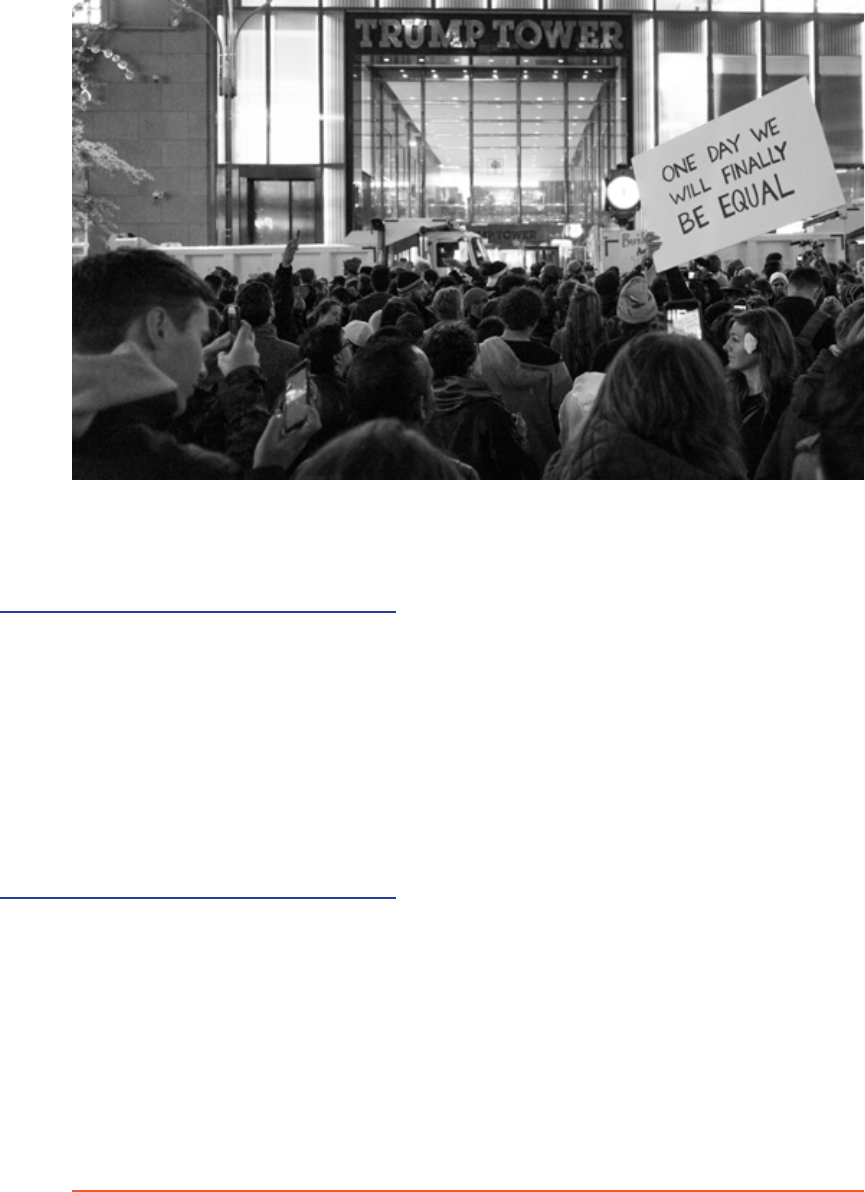
12 13
leadership on LGBT rights abroad has neg-
ative ramifications for LGBT people around
the world, especially those in sub-Saharan
Africa, majority Muslim and Arab countries,
and the former Soviet bloc in Eastern Europe
and Central Asia. It also poses a threat to
American citizens living abroad, for foreign
diplomats within the United States, and for
foreigners who benefit from U.S. foreign aid. It
is likely no accident that in the past two years
a number of governments have unleashed
campaigns of persecution against gay men or
LGBT people, including Tanzania,
42
Chechnya,
43
and Indonesia.
44
In 2018 the wave of anti-gay persecution worsened in Tanzania, with the government of Dar
es Salaam launching a task force to identify and round up gay people.
45
“They are raiding
houses. It is a horrible thing,” one activist told The Guardian. “It is just going to get worse.
So many people are leaving the city, running away. They are targeting the activists, saying
we are promoting homosexuality. We have to hide.” Another activist said that it is “open
season on gay people” and reported lists of names being published on social media
to “out people.”
46
The Trump Administration
has largely dropped LGBT
equality, and human rights
more broadly, from its foreign
policy priorities.
42
Gaey, Conor. (2017, June 27). Gay in Africa: “Even cows” disapprove of homosexuality, says Tanzanian president amid crackdown. Newsweek. https://
www.nytimes.com/aponline/2017/12/08/world/africa/ap-af-tanzania-gays.html
43
Kramer, Andrew E. (2017, April 1). Chechen authorities arresting and killing gay men, Russian paper says. New York Times. https://www.nytimes.
com/2017/04/01/world/europe/chechen-authorities-arresting-and-killing-gay-men-russian-paper-says.html?mtrref=www.google.com
44
Hutton, Jerey. (2017, December 20). Indonesia’s crackdown on gay men moves from bars into the home. New York Times. https://www.nytimes.
com/2017/12/20/world/asia/indonesia-gay-raids.html?mtrref=www.google.com
45
Burke J (2018, November 5). Hundreds in hiding as Tanzania launches anti-gay crackdown. The Guardian. https://www.theguardian.com/world/2018/
nov/05/tanzania-gay-people-in-hiding-lgbt-activists-crackdown
46
Ibid.

14 15
On January 1, Secretary of State Mike Pompeo attended the inauguration of Brazil’s new
president Jair Bolsonaro. Bolsonaro, a former Army captain who long served as a con-
gressman but operated at Brazil’s political margins because of his far right political views,
campaigned on a racist, sexist, homophobic platform.
46.1
Bolsonaro has in the past said he
would rather die than have a gay son, advocated that parents should “beat the gay” out of
their children, and in 2013 proclaimed, “Yes I am homophobic–and very proud of it.”
46.2
Bol-
sonaro has already inspired violence against the LGBT community in Brazil. In October 2018,
a transgender woman and a drag queen were both murdered, with the attackers in both
incidents invoking Bolsonaro’s name.
46.2
On his first day in oce, he signed an executive
order prohibiting the country’s human rights ministry from hearing any concerns from the
country’s LGBT community.
46.3
He also signed executive orders targeting the descendants of
slaves and the country’s indigenous populations. After the inauguration, Pompeo tweeted
out a photo of himself meeting with Bolsonaro thanking him for a great meeting to “rein-
force our shared commitment to democracy, education, prosperity, security, and #human-
rights.”
46.4
VI. RELIGIOUS REFUSAL POLICIES
In its second year in oce, the Trump Administration continued to enforce and endorse
religious liberty policies and legislation that would allow for discrimination against LGBT
people based on religious beliefs.
In January 2018, the U.S. Department of Health and Human Services created the Division of
Conscience and Religious Freedom under the Oce of Civil Rights (OCR). This division was
created following President Trump’s 2017 executive order, which directed federal agencies
to expand religious freedom protections in ways that could increase discrimination against
LGBT individuals and same-sex couples.
47
Also in early 2018, OCR collected public com-
ments regarding a new proposed rule titled, “Protecting Statutory Conscience Rights in
Health Care; Delegations of Authority.” While this proposed rule did not specifically mention
LGBT people, sexual orientation, or gender identity, it could easily be interpreted as codi-
fying anti-LGBT discrimination in health care. The proposed rule states that “freedom from
discrimination on the basis of religious belief or moral conviction…does not just mean the
right not to be treated dierently or adversely; it also means being free not to act contrary
46.1
Haltiwanger, J (2018, Oct. 29). “The ‘Brazilian Donald Trump’ just became president in a landslide. He got there despite saying he couldn’t love
a gay son and that a colleague was too ‘ugly’ to be raped.” Business Insider. https://www.businessinsider.com/jair-bolsonaro-brazil-election-re-
sults-trump-2018-10
46.2
Sullivan, Zoe. (2018, Oct. 29). “LGBTQ Brazilians on edge after self-described ‘homophobic’ lawmaker elected president.” Associated Press. https://
www.nbcnews.com/feature/nbc-out/lgbtq-brazilians-edge-after-self-described-homophobic-lawmaker-elected-president-n925726
46.3
AP Sta. (2019, Jan. 3) Brazil’s Bolsonaro targets minorities on 1st day in oce. Associated Press. https://www.nbcnews.com/feature/nbc-out/bra-
zil-s-bolsonaro-targets-minorities-1st-day-oce-n954181
46.4
(2019, Jan. 2) Twitter. https://twitter.com/SecPompeo/status/1080485576564969472
47
Cha, A., Eilperin, J. (2018, January 17). New HHS civil rights division to shield health workers with moral or religious objections. Washington Post.
https://www.washingtonpost.com/national/health-science/trump-administration-creating-civil-rights-division-to-shield-health-workers-with-moral-
or-religious-objections/2018/01/17/5663d1c0-e2-11e7-8f66-2df0b94bb98a_story.html

14 15
to one’s beliefs.” This language is exceptionally broad,
and could be interpreted to allow providers to deny
general health care services to LGBT people, as well
as specific services such as STI screening to a gay
man, fertility treatment to a lesbian couple, or gen-
der armation treatment to a transgender individual.
Rules and regulations that allow health care providers
to discriminate based on religious beliefs will only ex-
acerbate anti-LGBT discrimination in health care.
In July 2018, then-Attorney General Je Sessions an-
nounced the creation of a Religious Liberty Task Force
that will enforce the 2017 memo issued by the De-
partment of Justice on religious liberty. In the speech
announcing the formation of the task force, Sessions
said, “A dangerous movement…is now challenging
and eroding our great tradition of religious freedom,”
which “must be confronted and defeated.” The Reli-
gious Liberty Task Force is led by Associate Attorney
General Jesse Panuccio, who previously defended
supporters of Proposition 8, the 2008 ballot measure
which prohibited marriage for same-sex couples in
California.
48
The Human Rights Campaign called the Religious Liberty Task Force part of:
“…a brazen campaign to erode and limit the rights of LGBTQ people in the name
of religion. The Attorney General standing shoulder-to-shoulder this morning with
anti-LGBTQ extremists tells you everything you need to know about what today’s
announcement was really all about.”
49
In August 2018, the Department of Labor (DOL) issued a new religious liberty directive
that could allow religiously-aliated organizations receiving federal funding to discrimi-
nate against LGBT people. The directive instructs Department of Labor sta to consider
recent religious liberty developments when enforcing nondiscrimination policies, citing the
Masterpiece Cakeshop (2018) and Hobby Lobby (2014) U.S. Supreme Court rulings in favor
of religious refusal as well as previous Trump Administration executive orders regarding
religious liberty. It states, “This Directive supersedes any previous guidance that does not
reflect these legal developments, for example, the section in OFCCP’s Frequently Asked
The 2018 directive was
clearly aimed at gutting
the sexual orientation
and gender identity
nondiscrimination
regulation aecting
federal contractors.
48
Burton T. (2018, July 31). “Je Sessions announces a religious liberty task force to combat ‘dangerous’ secularism.” Vox. https://www.vox.com/identi-
ties/2018/7/31/17631110/je-sessions-religious-liberty-task-force-memo-christian-nationalism
49
Ring T (2018, July 30). Sessions launches new LGBT assault with ‘Religious Liberty’ Task Force. The Advocate. https://www.advocate.com/poli-
tics/2018/7/30/sessions-launches-new-lgbt-assault-religious-liberty-task-force

16 17
Questions: Sexual Orientation and Gender Identity regarding ‘Religious Employers and
Religious Exemption.’” The OFCCP is the Oce of Federal Contract Compliance Programs.
The DOL directive specifically states that religious liberty should be taken into account
when enforcing Executive Order 11246, a 2014 order by President Obama that prohibits
anti-LGBT discrimination by organizations contracting with the federal government. This
2018 DOL directive was clearly aimed at gutting the sexual orientation and gender identity
nondiscrimination regulation aecting federal contractors, and will increase religion-based
discrimination against LGBT by federal contractors.
50
Background
In recent years, religious refusal legislation, which would allow the refusal of services to
LGBT people based on religious beliefs, has become more and more popular in states
across the country. Since religious conservatives’ U.S. Supreme Court victory in Burwell v.
Hobby Lobby Stores, Inc. (2014)—upholding a company’s refusal to cover contraception in
an employee health plan
51
—and the two pro-same-sex marriage Supreme Court rulings in
2013 and 2015,
52
religious conservatives have introduced a slew of state and federal bills
that frame refusal to serve LGBT people and/or same-sex couples as the Constitutional-
ly-guaranteed “free exercise” of religion. In September 2017, the Department of Health and
Human Services released its Draft Strategic Plan for FY 2018-2022 which made extensive
mention of faith and faith-based organizations, and, in contrast with previous years, not a
single mention of LGBT health. The strategic plan stated that the Department would “vig-
orously enforce” and “armatively accommodate” religious beliefs.
53
This language closely
mirrored the language of state and federal religious refusal legislation that is being used to
discriminate against LGBT people under the guise of religious freedom.
54,55,56
In October 2017, the Department of Justice issued a memorandum to all executive depart-
ments and agencies that could allow individuals and organizations to discriminate against
LGBT people and same-sex couples in health care and social services under the guise of
religious freedom. In the memo, then Attorney General Je Sessions argued that the Free
Exercise Clause “protects the right to perform or abstain from performing certain physical
acts in accordance with one’s beliefs.” This protection “encompass[es] aspects of obser-
vance and practice, whether or not central to, or required by, a particular religious faith.”
These freedoms apply to “private associations, and even businesses” as well as individuals
and religious organizations.
57
50
Johnson C. (2018, August 14). “New Trump Administration memo on Obama order alarms LGBT advocates.” The Washington Blade. https://www.
washingtonblade.com/2018/08/14/new-trump-admin-memo-on-obama-order-troubles-lgbt-advocates/
51
Supreme Court of the United States. 2014, June 30. Burwell, Secretary of Health and Human Services, et al. v. Hobby Lobby Stores, Inc., et al. Retrieved
from: https://www.aclu.org/legal-document/burwell-v-hobby-lobby-stores-supreme-court-opinion
52
Supreme Court of the United States. 2013. United States v. Windsor. 570 U.S. __ Docket No. 12-307; Supreme Court of the United States. 2015. Obergefell
v. Hodges. 576 U.S. __ Docket No. 14-556
53
U.S. Department of Health and Human Services. (2017). Draft Strategic Plan FY 2018-2022. https://www.hhs.gov/about/strategic-plan/index.html
54
Mississippi House of Representatives. 2016. House Bill No. 1523. http://billstatus.ls.state.ms.us/documents/2016/pdf/HB/1500-1599/HB1523SG.pdf
55
Tennessee State Legislature. (2016). An Act to amend Tennessee Code Annotated, Title 4; Title 49 and Title 63, relative to conscientious objections to
the provision of counseling and therapy. Amendment No. 1. Available online at: http://www.capitol.tn.gov/Bills/109/Amend/HA1006.pdf
56
O’Hara ME. (2016). First Amendment Defense Act would be “devastating” for LGBTQ Americans. NBC News. http://www.nbcnews.com/feature/nbc-
out/first-amendment-defense-act-would-be-devastating-lgbtq-americans-n698416
57
Attorney General Je Sessions. 2017. Federal law protections for religious liberty. Memorandum for all executive departments and agencies. Washing-
ton, DC. https://www.justice.gov/opa/press-release/file/1001891/download
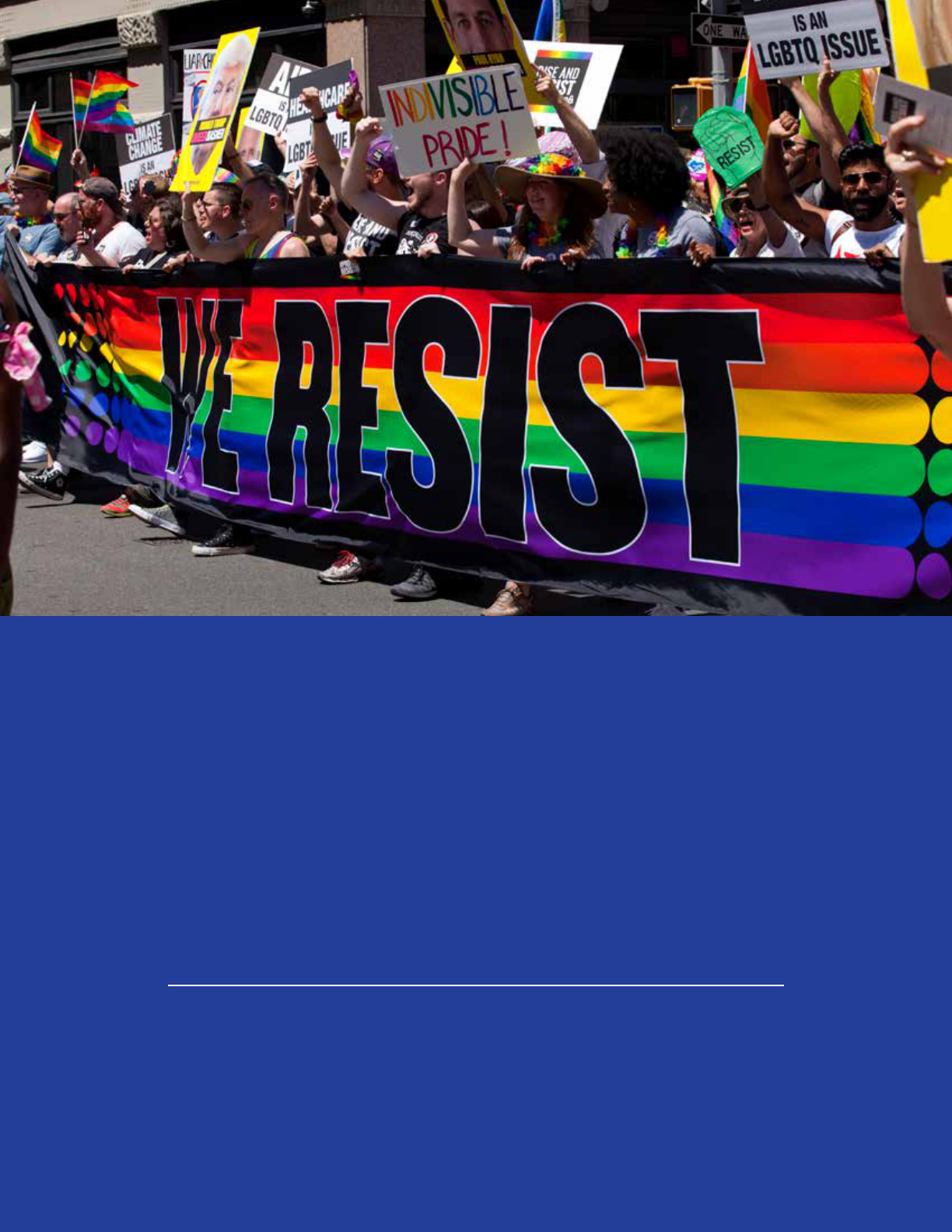
16 17
This memo could enable and encourage individuals and organizations to discriminate
against LGBT people and same-sex couples in health care and social services, including
health care and services funded by government contracts. It could also be seen as protect-
ing the right of government employees in a wide range of fields to refuse service to LGBT
people, same-sex couples, unmarried heterosexual couples, and single-parent families. In
the memo, Sessions also states that religious organizations should be able to accept federal
government grants and discriminate in hiring for programs funded by those grants.
58
A proposed rule issued by HHS on October 25, 2017 reiterated the Administration’s view
that religious organizations could receive funding from HHS to provide health care and other
services, even if they discriminate in providing care and services and in hiring based on their
religious views.
59
58
Ibid.
59
Removing Barriers for Religious and Faith-Based Organizations To Participate in HHS Programs and Receive Public Funding. A Proposed Rule by the
Health and Human Services Department on 10/25/2017. https://www.federalregister.gov/documents/2017/10/25/2017-23257/removing-barriers-for-re-
ligious-and-faith-based-organizations-to-participate-in-hhs-programs-and

18 19
Religion has been invoked to deny LGBT people access to health care. For example, LGBT
individuals have been denied appropriate mental health services and counseling;
60
a new-
born was denied care because her parents were lesbians;
61
transgender patients have been
denied transition-related medical care;
62
and an individual was denied his HIV medication,
63
all because of someone else’s religious beliefs. LGBT people already experience discrimina-
tion in health care. Federal regulations should be aimed at specifically enumerating sexual
orientation and gender identity in nondiscrimination regulations rather than codifying dis-
crimination under the guise of freedom of religion.
VII. HIV/AIDS POLICY
For most of its first two years in oce, the Trump Administration has been notably absent
from leadership on HIV/AIDS policy at a critical juncture in the domestic and global HIV
epidemics. In the U.S., 1 in 2 Black men who have sex with men (MSM) and 1 in 4 Latino MSM
will acquire HIV in their lifetimes if current infection rates persist.
64
As of January 2019, Pres-
ident Trump had not appointed a White House Oce of National AIDS Policy Director. The
important position has been vacant for two years, since Amy Lansky resigned in January
2017. At the end of 2017, President Trump summarily dismissed the Presidential Advisory
Council on HIV/AIDS (PACHA), exacerbating a vacuum of leadership on HIV/AIDS at the
federal level.
65
PACHA did not meet at all in 2018.
In November 2018, the Centers for Medicare and Medicaid Services (CMS) released a pro-
posed rule that would change requirements for protected classes of drugs in Medicare Part
D plan formularies. Currently, Part D plan formularies generally must include all drugs in six
protected categories, including antiretrovirals used to treat HIV. If enacted, the proposed
rule could allow insurance companies to have more control over patients’ access to medica-
tions–typically restricting the more expensive medications by requiring patients to first try
generic lower cost medications–rather than allowing providers to work directly with pa-
tients to decide what medication would be most eective, regardless of cost. Furthermore,
many HIV medications are not available in generic form in the U.S.
60
Ward v. Wilbanks, 09-CV-11237, 2010 WL 3026428 (E.D. Mich. 2010, July 26), rev’d and remanded sub nom. Ward v. Polite, 667 F.3d 727 (6th Cir. 2012),
dismissed with prej. by Ward v. Wilbanks, 09-CV-11237 (E.D. Mich. Dec. 12, 2012) (case settled).
61
Phillip A. (2015, February 19). “Pediatrician Refuses to Treat Baby with Lesbian Parents and There’s Nothing Illegal About It.” Washington Post. https://
www.washingtonpost.com/news/morning-mix/wp/2015/02/19/pediatrician-refuses-totreat-baby-with-lesbian-parents-and-theres-nothing-ille-
gal-about-it/
62
National Women’s Law Center. (2014, May.) Health Care Refusals Harm Patients: The Threat to LGBT People and Individuals Living with HIV/AIDS.
Available online at: http://www.nwlc.org/sites/default/files/pdfs/lgbt_refusals_factsheet_05-09-14.pdf
63
Complaint, Simoes v. Trinitas Reg’l Med. Ctr., No. UNNL-1868-12 (N.J. Super. Ct. Law Div. 2012, May 23).
64
The Centers for Disease Control and Prevention. (2016, February 23). Lifetime Risk of HIV diagnosis. https://www.cdc.gov/nchhstp/newsroom/2016/
croi-press-release-risk.html
65
Guaino, B. (2017, December 29). Trump administration fires all members of HIV/AIDS advisory council. Washington Post. https://www.washingtonpost.
com/news/to-your-health/wp/2017/12/29/trump-administration-fires-all-members-of-hivaids-advisory-council/?utm_term=.2c6b3d12ee0d

18 19
Despite these negative HIV/AIDS policy developments, at the Ryan White HIV/AIDS Confer-
ence in Maryland in December 2018, Secretary of Health and Human Services Alex Azar made
a number of announcements that indicate that the Trump Administration is taking steps to
address HIV in the U.S. First, Azar announced
that HHS will update the National HIV/AIDS
Strategy launched by President Obama in 2010
and updated in 2015 through 2020.
66
HHS host-
ed a listening session on the national strategy
at the conference. Azar said in his speech to
conference attendees that the 2020 strategy
would highlight PrEP uptake as a major tool to
prevent HIV infection. He also talked about the
importance of addressing disparities aecting
African Americans, Latinos, and gay men.
67
Azar also announced that he would reconvene
the Presidential Advisory Council on HIV/AIDS
in March 2019. PACHA will be cochaired by Carl
Schmid, Deputy Director of the AIDS Institute,
and John Wiesman, Secretary of Health for
Washington State.
68
The administration’s renewed attention to the
domestic epidemic and Secretary Azar’s ex-
plicit mention of PrEP, gay men, and Black and
Latino populations in his speech are welcome developments. We urge him to also explicitly
prioritize transgender women, and to understand that public policies that stigmatize gay men
and other LGBT people—such as the assaults on legal equality described above—and policies
that inhibit immigrants from accessing services, such as the proposed public charge rule (see
Section X below), undermine eorts to reduce racial/ethnic disparities in the epidemic.
One other positive development in domestic HIV policy in 2018 was the U.S. Preventive
Services Task Force’s proposed A rating for PrEP for HIV prevention.
69
Such a rating would
mean that insurance will fully cover PrEP, including copays. In its comment in support of this
proposed rating, the Fenway Institute encouraged the U.S. Preventive Services Task Force
(USPSTF) to also cover screenings for HIV and other STIs, and for some patients renal moni-
toring, as recommended by the CDC.
70
Fenway also recommended that future PrEP medica-
tions be covered, and that the USPSTF explicitly mention bisexuals in its guidance.
Focus on the Family was
awarded a grant from the
President’s Emergency Plan
for AIDS Relief (PEPFAR)
to implement an
abstinence-based
curriculum in South Africa.
66
Azar, A. (2018, December 12). HHS Secretary Azar’s Remarks to the National Ryan White Conference on HIV Care and Treatment. US Department of
Health and Human Services. https://www.hiv.gov/blog/hhs-secretary-azar-s-remarks-national-ryan-white-conference-hiv-care-and-treatment
67
Ibid.
68
Ibid.
69
U.S. Preventive Services Task Force (2018, November). Draft Recommendation Statement, Prevention of Human Immunodeficiency Virus (HIV) Infec-
tion: Pre-Exposure Prophylaxis. https://www.uspreventiveservicestaskforce.org/Page/Document/RecommendationStatementDraft/prevention-of-hu-
man-immunodeficiency-virus-hiv-infection-pre-exposure-prophylaxis
70
Centers for Disease Control and Prevention: US Public Health Service: Preexposure prophylaxis for the prevention of HIV infection in the United
States—2017 Update: a clinical practice guideline. https://www.cdc.gov/hiv/pdf/risk/prep/cdc-hiv-prep-guidelines-2017.pdf. Published March 2018.
Pages 47-48.

20 21
At the global HIV/AIDS level, the Trump Administration is giving renewed support to absti-
nence as a HIV/AIDS prevention tool. An international aliate of the anti-LGBT U.S. group
Focus on the Family was awarded a $49,505 grant from the President’s Emergency Plan
for AIDS Relief (PEPFAR) to implement an abstinence-based curriculum in South Africa.
Evidence has demonstrated a lack of ecacy of abstinence-based HIV/AIDS prevention
programs. Researchers have found no discernible change in sexual behavior as a result of
abstinence messaging on HIV/AIDS prevention.
71
The Focus on the Family South Africa web-
site promotes heteronormative constructs on its website, by stating “[marriage] is intended
by God to be a thriving, lifelong relationship between a man and a woman.”
72
Further, the
organization denigrates transgender individuals, by arguing that humans are “intentionally
and immutably” male and female.
73
VII. UNDERMINING THE AFFORDABLE CARE ACT
On December 14, 2018 Judge Reed O’Connor, a United
States District Judge of the United States District
Court for the Northern District of Texas, ruled that the
individual mandate of the Aordable Care Act (ACA)
was unconstitutional, and as a result, struck down the
entire ACA, which he argued cannot stand without the
individual mandate. In 2012, the U.S. Supreme Court
ruled that the individual mandate was constitutional
based on Congress’s ability to legally impose a tax
penalty on people who did not have health insurance.
As part of President Trump’s tax overhaul in Decem-
ber 2017, the tax penalty for not having health insur-
ance was dropped to zero dollars. This prompted a
group of Republican governors and state attorneys
general to file a lawsuit, arguing that since Congress
was no longer exercising its legal taxing power with
the penalty zeroed out, the individual mandate was
now unconstitutional. Judge O’Connor agreed, stating that the individual mandate “can no
longer be sustained as an exercise of Congress’s tax power.”
74
President Trump, who has
made several attempts to dismantle the ACA since the beginning of his presidency, tweeted
his approval of Judge O’Connor’s decision: “Great news for America!”
75
The ACA has been
71
McNeil, D., Jr. (2015, February 26). U.S. Push for Abstinence in Africa Is Seen as Failure Against H.I.V. New York Times. https://www.nytimes.
com/2015/02/27/health/american-hiv-battle-in-africa-said-to-falter.html
72
Lavers, M. K. (2018, April 24). Anti-LGBT South Africa group receives PEPFAR grant. Washington Blade. https://www.washingtonblade.
com/2018/04/24/anti-lgbt-south-africa-group-receives-pepfar-grant/
73
Ibid.
74
Goodnough A. and Pear R. (2018, December 14). “Texas Judge Strikes Down Obama’s Aordable Care Act as Unconstitutional.” The New York Times.
https://www.nytimes.com/2018/12/14/health/obamacare-unconstitutional-texas-judge.html
75
Yilek C (2018, December 14). Trump: ‘Great news’ that Obamacare ruled unconstitutional. The Washington Examiner. https://www.washingtonexamin-
er.com/news/trump-great-news-that-obamacare-ruled-unconstitutional
In 2018 President Trump
allowed insurance
plans that do not cover
pre-existing conditions,
such as HIV or cancer.

20 21
vital in expanding health insurance coverage to millions of Americans, and has dispropor-
tionately benefited traditionally underinsured and vulnerable populations, including LGBT
people
76
and people living with HIV
77
and other pre-existing conditions.
During 2018 President Trump took other steps to undermine the ACA, such as allowing
inexpensive, short-term insurance plans to be sold that do not cover pre-existing conditions,
such as HIV or cancer, and that do not oer most of the benefits and safeguards that the
ACA requires.
78
IX. PARTICIPATION IN FAMILY RESEARCH COUNCIL’S
ANTI-LGBT VALUES VOTERS SUMMIT
The Trump Administration’s alignment with the Family Research Council, a staunchly
anti-LGBT activist group, underlines the administration’s hostile stance toward LGBT peo-
ple. In September 2018, Vice President Mike Pence and Secretary of State Mike Pompeo
addressed the Family Research Council’s annual Value Voters Summit in 2018.
79
President
Trump spoke to the 2017 Values Voters Summit.
80
Anti-LGBT rhetoric is a recurring theme
among the speeches given at this summit.
81
That Trump, Pence and Pompeo would address
this religious right, anti-LGBT political pep rally underscores the Trump Administration’s
deep hostility to LGBT people and LGBT equality.
76
Karpman M, Skopec L, Long S. (2015, April 5). QuickTake: Uninsurance Rate Nearly Halved for Lesbian, Gay, and Bisexual Adults since Mid-2013.
Health Reform Monitoring Survey. http://hrms.urban.org/quicktakes/Uninsurance-Rate-Nearly-Halved-for-Lesbian-Gay-and-Bisexual-Adults-since-
Mid-2013.html
77
Belluz J (2017, February 15). Why Obamacare repeal would be devastating to people with HIV. Vox. http://www.vox.com/2017/2/8/14532310/
obamacare-aca-repeal-hiv-aids
78
Benen S (2018, August 1). To undermine the ACA, the Trump administration pushes ‘short-term’ plans. MSNBC. http://www.msnbc.com/rachel-mad-
dow-show/undermine-the-aca-the-trump-administration-pushes-short-term-plans
79
Fitzsimon T. (2018, September 24). Pence is first VP to speak at anti-gay group’s Values Voter Summit. NBC News. https://www.nbcnews.com/feature/
nbc-out/pence-first-vp-speak-anti-gay-group-s-values-voter-n912641
80
Taylor, J (2017, October 13). “Trump To Values Voters: In America ‘We Don’t Worship Government, We Worship God.’” National Public Radio. https://
www.npr.org/2017/10/13/557459193/trump-set-to-address-values-voter-summit-for-first-time-as-president
81
Cahill, S. and Burack, C. (2006, October). Internal enemy: Gays as the domestic al-Qaeda; A report from the Family Research Council’s Values Voter Sum-
mit. 2006: National Gay and Lesbian Task Force Policy Institute
Vice President Mike Pence, left, stands with Family Research Council President Tony Perkins before speaking at the
2018 Values Voter Summit in Washington, Saturday, Sept. 22, 2018. (AP Photo/Susan Walsh)

22 23
X. PROPOSED PUBLIC CHARGE RULE AND
ITS LIKELY IMPACT ON IMMIGRANTS’ ACCESS
TO HEALTH CARE AND OTHER SERVICES
On October 10, 2018, the Department of Homeland Security released a proposed rule
regarding the public charge definitions used to determine whether an immigrant is inadmis-
sible to the United States.
82
As written, the rule radically lowers the historical standard for
determining whether someone is “likely to become a public charge.” Under current policy,
only cash welfare assistance and government funded long-term care can be taken into con-
sideration in the public charge test. The proposed rule would alter this test such that any
person who seeks or uses a wide range of life-saving health and human services programs—
from housing assistance to health care (including treatment for HIV/AIDS) to anti-hunger
and anti-poverty services—could be deemed a public charge, which could create barriers to
maintaining or improving their immigration status.
If the proposed rule remains as is, it could result in individuals being deterred from using
vital services such as the Special Supplemental Nutrition Program for Women, Infants, and
Children (WIC), Medicaid or the Children’s Health Insurance Program (CHIP) to address their
basic health needs, ultimately leading to worse health and developmental outcomes for
them, their children, and their communities.
This is especially concerning for immigrants who identify as LGBT. Immigrants make up a
significant population of the LGBT community. The Williams Institute at UCLA School of
Law estimates there are 637,000 LGBT-identified individuals among the adult authorized
immigrant population.
83
Concerns regarding barriers to health care utilization as a result of
this proposed rule could be amplified for LGBT immigrants, because anti-LGBT discrimi-
nation in healthcare is common and already acts as a barrier to seeking necessary medical
treatment. A survey conducted by Lambda Legal found that 56% of LGB respondents and
70% of transgender respondents reported having at least one discriminatory experience—
such as refusal of service, harsh or abusive language, being blamed for their health sta-
tus, etc.—in a healthcare facility.
84
The survey also found that a higher proportion of LGBT
people of color and/or low-income people reported experiencing discriminatory care. These
experiences of discrimination act as a barrier to seeking necessary care in the first place,
and if the proposed rule is adopted, LGBT immigrants will be deterred even further from
seeking healthcare that they need.
82
Department of Homeland Security. (2018, October 10). Inadmissibility on Public Charge Grounds. Proposed Rule. DHS Docket No. USCIS-2010-0012.
https://www.federalregister.gov/documents/2018/10/10/2018-21106/inadmissibility-on-public-charge-grounds
83
Gates, G.J. (2013), “LGBT Adult Immigrants in the United States,” UCLA School of Law: The Williams Institute. https://williamsinstitute.law.ucla.edu/
wp-content/uploads/LGBTImmigrants-Gates-Mar-2013.pdf
84
Lambda Legal. 2010. When Health Care Isn’t Caring: Lambda Legal’s Survey of Discrimination against LGBT People and People with HIV. New York:
Lambda Legal.

22 23
The proposed rule also introduced a new test for income, where earning under 125% of the
federal poverty level ($31,375 annually for a family of 4) would be considered a negative
factor in deciding whether an immigrant could be granted a green card or permanent resi-
dency. LGBT people, including those who are immigrants, experience widespread workplace
discrimination which hurts their ability to attain and maintain economic security. A 2017
national survey found that one in five LGBT people experienced discrimination due to their
sexual orientation or gender identity when applying for a job, and 22% reported experienc-
ing this discrimination in pay or promotions.
85
In eect, this proposed rule would punish
LGBT immigrants for systemic workplace discrimination.
Furthermore, LGBT people are also more likely to depend on programs that could lead to a
public charge determination under the proposed rule. Research has shown that LGBT people
are more likely than non-LGBT people to report experiencing food insecurity,
86
and LGBT
people and their families are more than twice as likely to report receiving Supplemental Nu-
trition Assistance Program (SNAP) benefits.
87
LGBT people and their families are also more
likely to receive Medicaid benefits and more likely to rely on housing assistance programs
than non-LGBT people.
88
Penalizing immigrants for actual or predicted usage of a wide-
range of supplementary assistance in their lifetimes will likely disproportionately impact
LGBT immigrants and their families.
The proposed rule could also dispropor-
tionately aect the health and well-being
of immigrants living with HIV. Under the
proposed rule, an immigrant’s health,
including HIV status, would be considered
when determining whether the appli-
cant is likely to be able to work, attend
school, care for themselves, or require
expensive care or institutionalization.
For many people, HIV/AIDS treatment is
prohibitively expensive without assistance.
Under this rule, immigrants living with
HIV might forego using support services
and payment assistance for HIV treatment
due to fear of a public charge determination. This would be devastating to the health of the
individual, and could also have negative health consequences for the community at large, as
disruptions in HIV care and treatment—especially resulting in reduced adherence or medica-
tion rationing—can lead to drug resistant strains of HIV and increased transmission of HIV.
LGBT people are more
likely to depend on programs
that could lead to a public
charge determination under
the proposed rule.
85
Sejal Singh and Laura E. Durso (2017). “Widespread Discrimination Continues to Shape LGBT People’s Lives in Both Subtle and Significant Ways,”
Washington, DC: Center for American Progress. https://www.americanprogress.org/issues/lgbt/news/2017/05/02/429529/widespread-discrimina-
tion-continues-shape-lgbt-peoples-lives-subtle-significant-ways/
86
Taylor N.T. Brown, Adam P. Romero, and Gary J. Gates (2016). “Food Insecurity and SNAP Participation in the LGBT Community.” UCLA: The Williams
Institute. https://williamsinstitute.law.ucla.edu/research/lgbt-food-insecurity-2016/
87
Rooney C (2018). “Protecting Basic Living Standards for LGBTQ People.” Washington, DC: Center for American Progress. https://www.americanprog-
ress.org/issues/lgbt/reports/2018/08/13/ 454592/protecting-basic-living-standards-lgbtq-people/
88
Ibid.

24 25
XI. BUREAU OF PRISONS CHANGE IN POLICY ON
HOUSING ADULT TRANSGENDER PRISONERS
The Federal Bureau of Prisons (BOP) announced in May 2018 that, while it will continue to
make housing determinations on a case-by-case basis as required by the Prison Rape Elim-
ination Act (PREA), it will use “biological sex” to make initial determinations in the type of
housing transgender inmates are assigned, and will assign transgender prisoners to facilities
conforming to their gender identity only “in rare cases.”
89
This reverses a 2016 BOP policy
90
that housed adult prisoners based on their gender identity, not their birth sex.
The BOP’s latest decision runs directly counter to
the text and spirit of PREA, will undermine the safe-
ty and security of one of the most vulnerable prison
populations, and negates decades of progress on
LGBT rights and protections that were reflected in
the issuance of PREA standards in 2012.
91
Transgender prisoners are at higher risk of being
raped in prison than other prisoners. A best practice
is to place transgender women in women’s pris-
ons. According to the Bureau of Justice Statistics,
data from 2007 through 2012 indicate that 34.6%
of transgender people in state and federal prisons
and 34% in local jails reported some kind of sexual
victimization while incarcerated.
92
Among cisgender
heterosexual men, between 3.5% and 5.2% reported
sexual victimization. Among cisgender heterosexual
women, between 3.7% and 13.1% reported sexual vic-
timization. Rates of sexual victimization by another
prisoner against gay and bisexual men in prison are
also very high, about 10 times the rate for
heterosexual men.
93
The Federal Bureau of
Prisons will house
transgender prisoners
based on their sex at birth,
putting them at greater
risk of sexual and
physical abuse.
89
Federal Bureau of Prisons (2018, May 11). Change Notice to Transgender Oender Manual. https://www.documentcloud.org/docu-
ments/4459297-BOP-Change-Order-Transgender-Oender-Manual-5.html
99
http://www.prearesourcecenter.org/node/3927.
91
Cahill S (2017). From “Don’t drop the soap” to PREA standards: Reducing sexual victimization of LGBT people in the juvenile and criminal justice
systems. LGBTQ Politics: A Critical Reader. New York: New York University Press. 134-152.
92
Beck A. (2014). Sexual victimization in prisons and jails reported by inmates, 2011-12. Supplemental tables: Prevalence of sexual victimization among trans-
gender adult inmates. Washington DC: U.S. Department of Justice, Oce of Justice Programs, Bureau of Justice Statistics. http://www.bjs.gov/content/
pub/pdf/svpjri1112_st.pdf
93
Source: Beck AJ, Johnson C. (2012, May). Sexual victimization reported by former state prisoners, 2008. U.S. Department of Justice, Oce of Justice
Programs, Bureau of Justice Statistics. http://www.bjs.gov/content/pub/pdf/svrfsp08.pdf

24 25
According to the National PREA Resource Center, the new policy violates PREA Standards:
Does a policy that houses transgender or intersex inmates based exclusively on
external genital anatomy violate Standard 115.42(c) & (e)?
Yes. Standard 115.42(c) states:
In deciding whether to assign a transgender or intersex inmate to a facility for
male or female inmates, and in making other housing and programming assign-
ments, the agency shall consider on a case-by-case basis whether a placement
would ensure the inmate’s health and safety, and whether the placement would
present management or security problems.
In addition, Standard 115.42(e) states:
A transgender or intersex inmate’s own views with respect to his or her own safety
shall be given serious consideration.
94
94
National PREA Resource Center (2016, March 24). https://www.prearesourcecenter.org/node/3927

26 27
XII. DEPARTMENT OF VETERANS AFFAIRS
PROPOSED EXCLUSION OF GENDER ALTERATIONS
FROM THE MEDICAL BENEFITS PACKAGE
On July 9, 2018, the Department of Veterans Aairs (VA) released a request for comments
regarding gender armation surgery.
95
Currently, in the VA’s medical regulations, there is
a provision that excludes “gender alterations” from its medical benefits package. While the
VA will provide medical services to transgender veterans before and after gender ar-
mation surgery, the VA has thus far excluded the actual surgery from its medical benefits
package. Gender armation surgery and hormone treatment are considered medically
necessary by many physicians for their transgender patients. The American Medical Associ-
ation adopted a resolution in 2008 supporting public and private health insurance coverage
for treatment of gender identity disorder as recommended by the patient’s physician.
96
In
response to petitions to include medically necessary gender armation surgery in its medi-
cal benefits package, the VA released this request for comments to seek input to determine
whether or not to amend the medical benefits package and eliminate the exclusion of medi-
cally necessary and life-saving gender armation surgery. A final decision regarding gender
armation surgery has not yet been released by the VA.
XIII. FOOD AND DRUG ADMINISTRATION
REGULATION OF E-CIGARETTES
In November 2018, the Food and Drug Administration announced aggressive new regula-
tions to reduce youth use of e-cigarettes. These include banning the sale of flavored tobac-
co products used in e-cigarettes.
97
Stricter regulation of e-cigarettes is important for LGBT
people. According to the Massachusetts Behavioral Risk Factor Surveillance System survey,
LGBT people aged 18-24 reported nearly three times the rate of e-cigarette use compared
to non-LGBT people in the same age category (16.7% vs. 5.7%).
98
National data from the
Population Assessment of Tobacco and Health (2013-2014) found higher rates of e-cigarette
use among LGB people.
99
95
Department of Veterans Aairs. (July 9, 2018). “Exclusion of Gender Alterations From the Medical Benefits Package.” Request for Comments. Doc-
ument Citation 83 FR 31711. https://www.federalregister.gov/documents/2018/07/09/2018-14629/exclusion-of-gender-alterations-from-the-medi-
cal-benefits-package
96
H-185.950 Removing Financial Barriers to Care for Transgender Patients. Our AMA supports public and private health insurance coverage for treat-
ment of gender identity disorder as recommended by the patient’s physician. (Res. 122; A-08). http://www.ama-assn.org/ama/pub/about-ama/our-peo-
ple/member-groups-sections/glbt-advisory-committee/ama-policy-regarding-sexual-orientation.page?
97
U.S. Food and Drug Administration (2018, November 16). FDA’s deeming regulations for e-cigarettes, cigars, and all other tobacco products. https://
www.fda.gov/tobaccoproducts/labeling/rulesregulationsguidance/ucm394909.htm
98
Massachusetts Department of Public Health. 2016. Massachusetts Behavioral Risk Factor Surveillance System.
99
Wheldon C, Kaufman A, Kasza K, Moser R (2018). Tobacco use among adults by sexual orientation: Findings from the Population Assessment of Tobac-
co and Health Study. LGBT Health
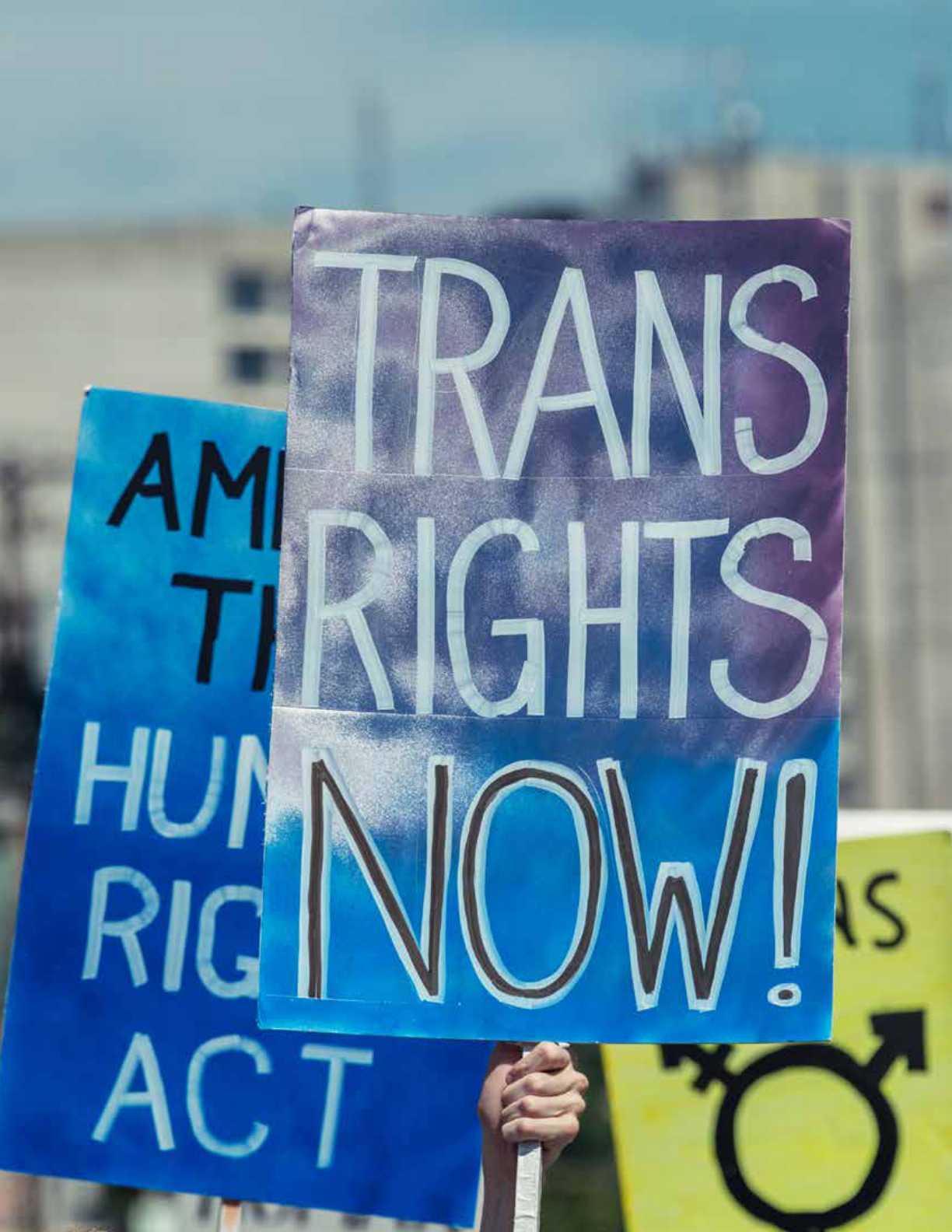
26 27

28 29
LGBT people and people living with HIV in the U.S.
and around the world are now much more vulnerable
to discrimination.
CONCLUSION
During its first year in oce, the Trump Administration compiled a strikingly anti-LGBT
record of actions that undermined the health and well-being of LGBT people. In its second
year in oce, the Trump Administration added to its anti-LGBT record by continuing to un-
dermine the ability of LGBT people to access health care and other services, restricting the
right of transgender people to serve in the military, prohibiting people living with HIV from
serving in the Peace Corps, promoting religion-based discrimination against LGBT people,
eliminating critical nondiscrimination protections, appointing federal judges who oppose
LGBT equality, and aliating frequently with anti-LGBT advocacy organizations, such as
Focus on the Family and the Family Research Council.
While there were some potentially hopeful developments—such as the FDA’s regulation of
e-cigarettes and the plans to develop a new national HIV/AIDS strategy to take eect in
2020—these positive developments were few and far between. Overall in its second year in
oce, the Trump Administration continued building upon the striking record against LGBT
rights that it amassed in its first year. Unfortunately, the Trump Administration continues to
expand discriminatory policies toward LGBT people.
Some of the actions that the Trump Administration has taken will have predictable and
quantifiable repercussions, such as the loss of health insurance due to the undermining
of the ACA. However, it is more dicult to predict the full extent of harm of many of the
Trump Administration’s anti-LGBT actions, such as its support of religious refusal legislation,
reinterpretation of sex discrimination, appointment of anti-LGBT conservative justices, and
other attempts to rollback LGBT rights and protections that have taken decades to pass.
The Trump Administration’s embrace of anti-gay leaders like Brazilian President Bolsonara,
and anti-LGBT groups like the Family Research Council, endanger the safety of LGBT people
around the world. Discrimination against idealistic Americans living with HIV trying to serve
in the Peace Corps exacerbates stigma, which undermines the global fight against HIV. It is
undeniable that LGBT people and people living with HIV in the U.S. and around the world
are now much more vulnerable to discrimination in health care, social services, employment,
education, and access to basic government services.

28 29
AUTHORS
Sean Cahill, PhD
Director of Health Policy Research
The Fenway Institute
Tim Wang, MPH
Health Policy Analyst
The Fenway Institute
Bishar Jenkins
Health Policy Fellow
The Fenway Institute
ACKNOWLEDGEMENTS
The Fenway Institute acknowledges the National Center for Transgender Equality and
GLAAD for their helpful lists of Trump Administration actions undermining LGBT equality.
Jordan Hutensky
Designer
Cover photo: PAUL J. RICHARDS/AFP/Getty Images
Photo top of page 21: AP Photo/Susan Walsh
All other photos purchased through Getty Images
© The Fenway Institute, 2019

30 PB
TFIP-23
TEL 617.927.6400
WEB thefenwayinstitute.org EMAIL information@fenwayhealth.org
THE FENWAY INSTITUTE 1340 Boylston Street, Boston, MA 02215
